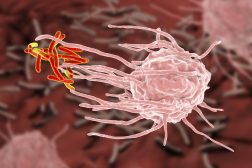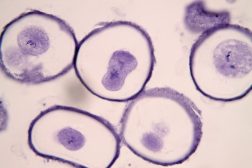Definition
noun
A medical condition in the fetus or newborn in which many erythroblasts are released in fetal blood from the bone marrow in order to compensate for the red blood cells destroyed by hemolysis that results from maternal-fetal blood group incompatibility, specifically involving the rh factor or the ABO blood groups.
Supplement
For instance, the mother is rH- while the fetus is rH+. When the antibodies of the rH- mother enter fetal circulation the antibodies attack the red blood cells of the rH+ fetus, resulting to hemolysis and anemia in fetus. Symptoms include jaundice, anemia, enlarged liver and spleen. When the condition is moderate or severe, many erythroblasts are present in fetal blood, hence, the name, erythroblastosis fetalis.
Variant: erythroblastosis foetalis
Synonyms:
- Hemolytic disease of the newborn or HDN
- Hemolytic disease of the fetus and newborn or HDFN
See also: Rhesus disease, ABO hemolytic disease of the newborn







